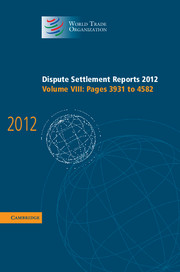Book contents
- Frontmatter
- Contents
- China — Measures Related to the Exportation of Various Raw Materials (WT/DS394, WT/DS395, WT/DS398)
- PHILIPPINES - TAXES ON DISTILLED SPIRITS
- TABLE OF CONTENTS
- CASES CITED IN THESE REPORTS
- LIST OF ABBREVIATIONS USED IN THESE REPORTS
- 1 INTRODUCTION
- II ARGUMENTS OF THE PARTICIPANTS AND THE THIRD PARTICIPANTS
- III ISSUES RAISED IN THIS APPEAL
- IV BACKGROUND
- V ARTICLE III:2, FIRST SENTENCE, OF THE GATT 1994
- VI ARTICLE III:2, SECOND SENTENCE, OF THE GATT 1994
- VII FINDINGS AND CONCLUSIONS IN THE APPELLATE BODY REPORT WT/DS396/AB/R
- VIII FINDINGS AND CONCLUSIONS IN THE APPELLATE BODY REPORT WT/DS403/AB/R
- ANNEX I NOTIFICATION OF AN APPEAL BY THE PHILIPPINES, WT/DS396/7, WT/DS403/7
- ANNEX II NOTIFICATION OF AN OTHER APPEAL BY THE EUROPEAN UNION, WT/DS396/8, WT/DS403/8
- PHILIPPINES - TAXES ON DISTILLED SPIRITS
- Cumulative List of Published Disputes
V - ARTICLE III:2, FIRST SENTENCE, OF THE GATT 1994
from PHILIPPINES - TAXES ON DISTILLED SPIRITS
Published online by Cambridge University Press: 13 December 2017
- Frontmatter
- Contents
- China — Measures Related to the Exportation of Various Raw Materials (WT/DS394, WT/DS395, WT/DS398)
- PHILIPPINES - TAXES ON DISTILLED SPIRITS
- TABLE OF CONTENTS
- CASES CITED IN THESE REPORTS
- LIST OF ABBREVIATIONS USED IN THESE REPORTS
- 1 INTRODUCTION
- II ARGUMENTS OF THE PARTICIPANTS AND THE THIRD PARTICIPANTS
- III ISSUES RAISED IN THIS APPEAL
- IV BACKGROUND
- V ARTICLE III:2, FIRST SENTENCE, OF THE GATT 1994
- VI ARTICLE III:2, SECOND SENTENCE, OF THE GATT 1994
- VII FINDINGS AND CONCLUSIONS IN THE APPELLATE BODY REPORT WT/DS396/AB/R
- VIII FINDINGS AND CONCLUSIONS IN THE APPELLATE BODY REPORT WT/DS403/AB/R
- ANNEX I NOTIFICATION OF AN APPEAL BY THE PHILIPPINES, WT/DS396/7, WT/DS403/7
- ANNEX II NOTIFICATION OF AN OTHER APPEAL BY THE EUROPEAN UNION, WT/DS396/8, WT/DS403/8
- PHILIPPINES - TAXES ON DISTILLED SPIRITS
- Cumulative List of Published Disputes
Summary
109. We begin with the Philippines' appeal of the Panel's findings that imported distilled spirits made from non-designated raw materials and domestic distilled spirits made from designated raw materials are “like products” within the meaning of Article III:2, first sentence, of the GATT 1994 and that, as a consequence, by subjecting imported distilled spirits made from non-designated raw materials to internal taxes in excess of those applied to “like” domestic distilled spirits made from designated raw materials, the Philippines acts in a manner inconsistent with Article III:2, first sentence, of the GATT 1994.
110. Specifically, the Philippines challenges the Panel's findings that: (i) all distilled spirits at issue in this dispute are “like products”, whether imported or domestic, and irrespective of the raw materials from which they are made; and (ii) each type of imported distilled spirit at issue in this dispute made from non-designated raw materials is “like” the same type of domestic distilled spirit made from designated raw materials.
111. We address first the Philippines' appeal of the Panel's finding that each type of imported distilled spirit at issue in this dispute made from non-designated raw materials is “like” the same type of domestic distilled spirit made from designated raw materials. In so doing, we review the Panel's findings on the specific factors it examined in its analysis of “likeness” under Article III:2, first sentence, of the GATT 1994.
- Type
- Chapter
- Information
- Dispute Settlement Reports 2012 , pp. 4211 - 4232Publisher: Cambridge University PressPrint publication year: 2014

